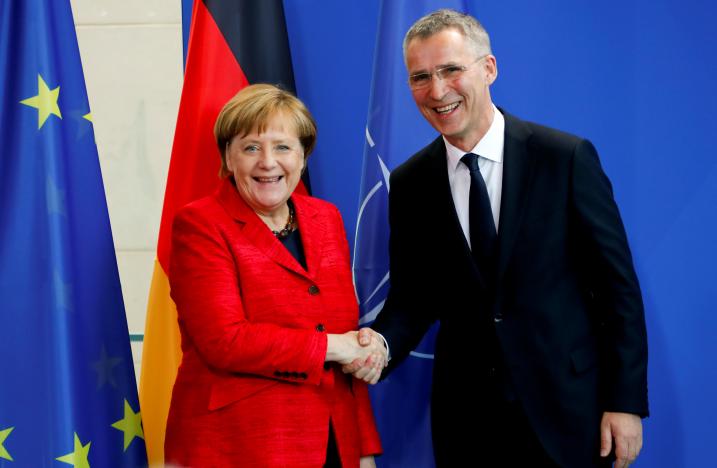German Chancellor Angela Merkel addressed questions pertaining to the ongoing fight against Islamic Extremists in Afghanistan on Thursday, in which she suggested that Germany would not be the nation to provide additional troops to the fight.
Appearing in a joint press conference with NATO Secretary General Jens Stoltenberg who would later address NATO spending, Merkel made it clear that she would not make any formal decisions until seeing NATO’s new assessment of the request for an influx of troops, but still made it clear that she did not foresee an increase in Germany’s responsibilities to the region.
Merkel, who is currently amid a reelection bid for her fourth term in office, likely does not want to suggest an increase in military deployments in the months leading up to the September election, as many Germans are wary of militaristic leadership.
“I don’t think we’re first in line to expand our capacities there. It’s more important to ensure that … stability is guaranteed in the north,” Merkel said.
“I want to state very clearly, that even if such a decision is made, it will not mean that any military activity that Germany currently carries out, for instance, AWACS surveillance, will be expanded or something like that.”
Stoltenberg echoed Merkel’s sentiments, explaining that NATO’s assessment was due to be released “within weeks,” and emphasizing that the international organization was not seeking a return to combat operations in Afghanistan, instead focusing on “train, assist and advise” missions.
“If there is any increase, which is not yet decided, then we will go out and ask all allies and partners,” he said.
Another topic regularly discussed by NATO member nations is the issue of budgeting. Donald Trump made headlines during his presidential campaign by suggesting that many of the nations that make up the alliance fail to meet their financial obligations for membership. At the time, Trump suggested that the US may not come to the aid of members that fail to meet their own obligations and was met with a significant resistance in the international media. The irony of vilifying Trump over suggesting he wouldn’t meet America’s obligation to the treaties that bind NATO while failing to recognize other members already weren’t, was likely not lost on Trump, or President Obama who made similar statements during his administration without receiving any such backlash.
NATO member states are required by the terms of their alliance to devote two percent of their gross domestic product to defense spending. This allows every state to participate to what can be considered an “equivalent” extent despite some nations, like the United States, having considerably more resources to pull from. In simple terms, if NATO is a house being rented by 28 roommate nations, the roommate that makes $100,000 a year puts $2,000 toward the rent while others who make only $20,000 a year need only to add $400.
As the wealthier roommate, the United States is on the hook for more than 22% of NATO’s direct funding budget, while countries like Albania account for less than one percent. In fact, the US is the only nation responsible for a double-digit portion of the overall budgetary pie, but we’ve accepted that role because we can afford it.
Unfortunately, only five of the 28 nations that makeup NATO are actually allocating the minimum funding to defense as laid out by NATO’s charter, making the other 23 the kinds of roommates that don’t chip in for the groceries but still drink all the milk.
Already have an account? Sign In
Two ways to continue to read this article.
Subscribe
$1.99
every 4 weeks
- Unlimited access to all articles
- Support independent journalism
- Ad-free reading experience
Subscribe Now
Recurring Monthly. Cancel Anytime.
According to Stoltenberg on Thursday, this is because NATO nations that agreed in 2014 that they’d finally start meeting their financial obligations, didn’t mean they’d do it right away.
“What we promised was to stop the cuts, gradually increase and then move toward 2 percent,” Stoltenberg said. “And actually Germany and many of the European allies have started to do exactly that.”
President Trump has warmed his stance on NATO since taking office, possibly because he’s confident that other member-states are indeed working toward meeting their obligations as Stoltenberg suggests.
Image courtesy of Reuters










COMMENTS